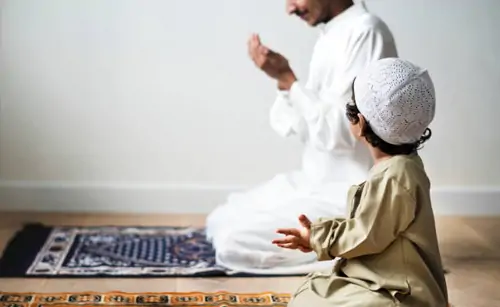Namaz (Prayer): Importance of Namaz in Muslim Life

Islam is built on five essential pillars, and among them, Namaz (Salah) holds a central role. As the second pillar, its importance is so profound that Allah has made it obligatory five times a day. Without even speaking, a person performing Namaz reflects the essence of their faith. In this blog, readers will explore the purpose of Namaz, its spiritual benefits, and practical insights into how to pray. Whether you’re new to Islam or seeking a deeper connection, this guide is crafted to inform and inspire. In the end, we assure you that you will find this blog very informative if you need to learn how to pray Namaz or know about the importance of Namaz in Islam.
Understanding the Purpose of Namaz
Namaz is obligatory for all Muslims because it represents the true face of our noble religion. On the other hand,Allah Almighty announces it as the key to paradise because it not only helps in the closeness of God but also helps us take care of taqwa, which accurately represents Islam. To perform Namaz, one must be aware of the steps of prayer; otherwise, Allah does not accept the worship. It shows that prayer helps us to implement consistency in our lives.
What Does Namaz Mean?
Namaz, also known as Salah, is one of the most important acts of worship in Islam. The meaning of Namaz goes beyond just prayer — it is a way to connect with Allah, seek forgiveness, and find peace in our hearts. In Islam, Namaz is performed five times a day and reminds every Muslim of their purpose and faith. Namaz is not only a daily obligation but also a spiritual journey that purifies the soul and strengthens the bond between a believer and the Creator.
History of Namaz

We believe Hazrat Adam is Allah's first messenger and human being on earth. The history of Namaz is as old as that of human beings because all the Prophets of Allah practiced it. This fact reveals that every messenger (from Hazrat Adam to Hazrat Mohammad) offered prayer with the same pattern.
Talking about the prayer habits of the last Prophet, he first offered Namaz e Duhur after the announcement of his prophethood. In the Quran, Allah clearly orders us to offer prayer five times daily as an obligatory deed. The Almighty does not favor those who ignore or undervalue the second pillar of Islam.
Importance of Namaz

Allah likes obedience, and for those who succeed in this task, Allah offers many rewards in this world and Jannah as well. Regarding the importance of namaz, it undoubtedly has great significance, akin to the benefits of reading the Quran. That is why Allah keeps it among the pillars of religion. We will review the content about Namaz's significance in the following passages.
Direct Communication with the Creator
Though Allah does not exist outwardly, he shows his indication that every piece of the universe is the Creator of the world, sun, stars, moon, and humans.
- In the Quran, Allah says, "I have created this world,"
and such verses show his supremacy. At another spot in the Quran,
- he says, "Bow your knees if you desire to communicate with me."
Here, bowing knees refers to the act of offering Namaz (prayer)—the most direct and sincere form of communication with Allah. It is through this act that a believer spiritually connects with their Creator.
If you don't yet know how to perform Namaz, you can learn Namaz online with Awwal Quran through step-by-step, guided classes led by expert teachers.

Leads to Taqwa
If you want Allah Almighty to accept all of your worship, it is essential to follow taqwa. Here, Taqwa means righteousness, which is the primary objective, and it is not achievable without praying Namaz five times a day. To move on the right path, we need to value the Namaz. It is because whenever we see a person attached to prayer, the first thing that comes to our mind is that he is a clean man internally.
What is Sajda in Namaz?
Sajda (prostration) is one of the most significant and humbling parts of Namaz (prayer). It involves placing the forehead, nose, hands, knees, and toes on the ground in complete submission to Allah ﷻ. Sajda reflects the ultimate act of humility, showing that the worshipper recognizes the greatness of the Creator and his own dependence on Him. In Islamic teachings, it is during Sajda that a believer is closest to Allah, making it a moment of deep spiritual connection.
In simple terms, namaz adalah bentuk ibadah wajib yang dilakukan umat Islam lima kali sehari untuk menunjukkan ketaatan kepada Allah—dan sajda dalam namaz adalah puncak dari ibadah tersebut, saat seorang hamba merendahkan dirinya sepenuhnya di hadapan Tuhan.
English illiteration of Arab prayer
In transliteration (English illiteration of Arab prayer), “Subhana Rabbiyal A’la” is recited in Sajada, which means "Glory is to my Lord, the Most High".

if you want to learn Namaz step by step, then visit our blog NAMAZ GUIDE, in which everything is step by step for the user to understand
The Reward at Dooms Day and Life Afterword
In the hereafter, Muslims will be held accountable for every action, good or harmful, that they take while on earth. However, the true benefit of Salah will be realized in the hereafter when Allah Almighty bestows particular blessings on that person. All acts are rewarded in the afterlife.
Enhance the Sense of Responsibility

Prayer increases the sense of duty by encouraging reflection and connecting with one's ideals or higher power. People become more conscious of their actions and their effects on others when they pray Namaz for wisdom or strength.
Their increased sense of accountability for acting following their values causes their sense of responsibility to increase. Namaz inspires people to live intentionally and morally, motivating them to accept responsibility for their decisions and deeds.
Shield Against Evil
Through the development of a strong spiritual bond, the invocation of divine direction, and the reinforcement of reasonable beliefs, prayer may shield us against evil. When we pray, we have access to our inner fortitude, compassion, and hope, which bolsters us in the face of adversity.

Through Namaz, we may strengthen our fortitude and become more courageous and wise in the face of evil. Additionally, praying namaz for heavenly protection fosters confidence in a higher authority and a sense of security, lessening dread and anxiety.
Prayer also prevents us from acting maliciously by encouraging us to embrace love, forgiveness, and empathy. In the end, prayer gives us the strength to overcome obstacles in life while protecting us from the attraction and effects of evil.
Spiritual Boost

Last but not least, Salah gives us a spiritual lift and spiritual empowerment. Moreover, it enables us to cross the choppy waters of everyday life, filled with difficulties and difficulties. The Prophet (peace and blessings be upon him) referred to Salah as his greatest delight in this life, which is understandable.
Importance of Salah According to Hadiths:
The Prophet Muhammad (peace be upon him) emphasized Salah more than any other individual act of worship. Its consistent observance reflects a person’s sincerity and obedience. The meaning of Namaz in Islam goes beyond ritual — it's the foundation of spiritual discipline and moral uprightness.
First Deed to Be Accounted for on the Day of Judgment
“The first thing about which the people will be called to account out of their actions on the Day of Judgment is Salah.” (Hadith - Abu Dawood)
This highlights that Salah and Sunnah are central to a Muslim's life and hereafter.
Key Difference Between Belief and Disbelief
The Prophet ﷺ said: “Between a man and shirk and kufr there stands his giving up Salah.” (Sahih Muslim)
This clarifies what is Salah in Islam: a boundary between belief and disbelief.
Salah Erases Sins
Daily prayers act as spiritual cleansing. The Prophet said that praying five times a day washes away sins like bathing removes dirt.
Salah as a Source of Comfort
“The coolness of my eyes is in Salah.” (Hadith - Ahmad)
This explains why should we pray — for spiritual peace and mental relief.
“If you're unsure how to pray Namaz in Islam, Awwal Quran’s guided courses will walk you through each step with clarity and care.”
Importance of Namaz According to the Quran:
The Quran repeatedly highlights Salah in Arabic and its significance as a path to spiritual success. It affirms that without prayer, a believer's faith remains incomplete.
A Command for Every Believer
“Indeed, Salah has been decreed upon the believers a decree of specified times.” (Surah An-Nisa 4:103)
This verse defines the importance of namaz/salah — it’s not optional, but a divine command.
Protection from Immorality
“Indeed, Salah restrains from shameful and unjust deeds.” (Surah Al-Ankabut 29:45)
This answers what is importance of namaz — it’s both worship and moral protection.
Gateway to Paradise
"Those who offer their prayers with all solemnity and full submissiveness... they will be the inheritors of Paradise." (Surah Al-Mu’minun 23:1-11)
Salat as the Sign of the True Believer
“Successful indeed are the believers, those who offer their Salah with humility.” (Surah Al-Mu’minun 23:1-2)
These verses beautifully reflect Salah in English understanding for global audiences.
Conclusion
In conclusion, no one can overstate the importance of Namaz. Active prayer offers numerous benefits, both for the individual and the community. Regular Prayer helps establish a strong connection with the divine, providing solace, guidance, and inner peace. Moreover, it instills discipline and fosters a sense of unity among believers. Embracing this sacred practice empowers us to lead a purposeful life grounded in faith and compassion for one another. Let us continue to prioritize Namaz for a fulfilling and harmonious existence.
FAQs
Why is Namaz important in Islam?
Namaz, also known as Salah, is one of the five pillars of Islam and holds immense spiritual significance. It establishes a direct connection between a person and Allah, helping Muslims maintain discipline and spiritual purity.
How many times a day should a Muslim perform Namaz?
Muslims are required to perform Namaz five times daily. Each prayer has a specific time, ensuring that the remembrance of Allah is consistent throughout the day.
What are the benefits of each Namaz?
Each Namaz offers distinct benefits. For example, Fajr helps start the day with a sense of peace, Dhuhr provides a midday spiritual break, Asr reminds us of patience, Maghrib signals gratitude for the day's blessings, and Isha brings the day to a peaceful close.
What should I do if I miss Namaz?
You should Perform Qaza Namaz as soon as possible.
How can one benefit from performing Namaz regularly?
Performing Namaz regularly not only fulfills a religious obligation but also brings mental clarity, physical well-being, and emotional stability. If you want to learn Namaz online, visit our comprehensive guide for step-by-step instructions to get started.














